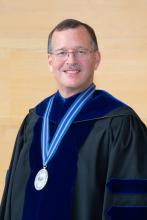Clifford Harding, MD, PhD, professor and chair of the Department of Pathology at Case Western Reserve University School of Medicine and University Hospitals Cleveland Medical Center, is a world class immunologist and major force in physician-scientist and professional-scientist education. His research focuses on the immunology of infectious diseases, particularly tuberculosis and HIV infection.
As chair of the Department of Pathology, which provides essential insights into disease processes and paves the way for new diagnostics and therapies, he oversees the research and clinical activities of more than 100 faculty and hundreds of staff members with expertise straddling several medical disciplines, including cancer, immunology, neuropathology, and basic and translational research.
He has built his department into the tenth-best funded in the US and also leads the MD/PhD-granting CWRU Medical Scientist Training Program, a flagship of the School of Medicine that is one of the largest such programs anywhere. MSTP prepares students for careers combining academic medicine and biomedical research. In this role he annually oversees over 100 students who work in the labs of more than 70 faculty members. In his 18 years directing the program, over 200 students have graduated with an MD/PhD. Additionally, he founded the Clinical and Translational Scientist Training Program at CWRU, which provides comprehensive training for physicians, nurses, and dentists focusing on clinical and translational research.
Harding was recruited to CWRU in 1993 following MD/PhD training, pathology residency and a period on the faculty at Washington University in St. Louis. In graduate school he published a breakthrough manuscript that provided the first description of exosomes, now known to be a universal feature in biology. Exosomes are small vesicles that promote a range of important cellular functions. These include transferring DNA, RNA, and proteins to other cells, thereby altering the function of the target cells; they also influence the pathology of carcinogenesis and inflammation. Harding’s manuscript has been cited over 820 times. On the 30th anniversary of the discovery of exosomes, he was invited to author a retrospective in the Journal of Cell Biology on their discovery and importance. Later he published seminal studies in immunology in the area of antigen processing and MHC function, and later in immune evasion mechanisms in tuberculosis.
In his career he has published more than 200 original papers, which have been cited more than 19,000 times, with his top ten having been cited in total over 7,000 times. He has been invited to give over 100 outside speaking engagements and has garnered over $50 million in grant funding for CWRU, statistics putting him in elite scientific company at CWRU. He has received numerous awards and honors and has been tapped by nearly all of the professional organizations he belongs to for leadership roles.
He has recruited over 70 clinical and scientific faculty members to CWRU and is well known for providing superlative mentoring for junior faculty members, contributing to his department’s overall success. In 2008 he was awarded the Women Faculty of the School of Medicine’s Gender Equity Award.


